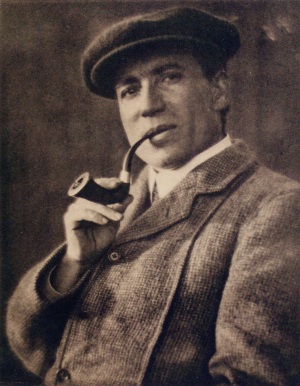W. H. Davies
Francis Thompson
Thou hadst no home, and thou couldst see
In every street the windows’ light:
Dragging thy limbs about all night,
No window kept a light for thee.
However much thou wert distressed,
Or tired of moving, and felt sick,
Thy life was on the open deck—
Thou hadst no cabin for thy rest.
Thy barque was helpless ’neath the sky,
No pilot thought thee worth his pains
To guide for love or money gains—
Like phantom ships the rich sailed by.
Thy shadow mocked thee night and day,
Thy life’s companion, it alone;
It did not sigh, it did not moan,
But mocked thy moves in every way.
In spite of all, the mind had force,
And, like a stream whose surface flows
The wrong way when a strong wind blows,
It underneath maintained its course.
Oft didst thou think thy mind would flower
Too late for good, as some bruised tree
That blooms in Autumn, and we see
Fruit not worth picking, hard and sour.
Some poets feign their wounds and scars.
If they had known real suffering hours,
They’d show, in place of Fancy’s flowers,
More of Imagination’s stars.
So, if thy fruits of Poesy
Are rich, it is at this dear cost—
That they were nipt by Sorrow’s frost,
In nights of homeless misery.
| Listen to this poem |
Read by MaryAnn · Source: Librivox.org |
| About the poet |
|
| By the same poet |
| Leisure |
| Money, O! |
| Days Too Short |
| A Plain Life |
| Joy and Pleasure |
| The Rain |
| Related books |
| William Henry Davies at amazon.co.uk |
Support this site
Please help us to improve this site by supporting the site on Patreon. As a supporter you will get access to the English Verse Discord server, where you can meet other poetry enthusiasts and help shape the development of the site.
 W. H. Davies
W. H. Davies